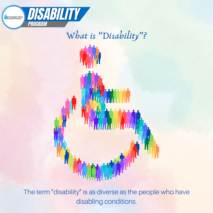What is “Disability”?

One of the BIGGEST misconceptions about “disability” is that the word only means one thing. When families speak with me about “disability” they are usually referring to the financial Social Security disability insurance (SSDI) benefit. It is so much more than that.
What is the definition of disability?
Disability really refers to how someone with a disabling condition navigates the world, and the benefits and rights they can access. The World Health Organization states “disability results from the interaction between individuals with a health condition with personal and environmental factors, including negative attitudes, inaccessible transportation and public buildings, and limited social support.” This definition highlights that disability isn’t a thing, but a way of life.
Why is it important to know the different definitions of disability?
Different laws, programs, and circumstances have different definitions of “disability.” It is your responsibility to understand those definitions to ensure your rights are protected and you get the benefits you need. For example, many people get denied Social Security benefits because they do not realize they have to meet the two-part definition of disability: (1) have a documented medical diagnosis AND (2) cannot work at ANY job in the United States.
What are the different definitions of “disability”?
I will go more in-depth in the coming weeks, but here are some of the areas that have their own disability definitions:
- Social Security
- Short-term and Long-term Disability Policies
- Education Accommodations
- Employment Accommodations
- Public Accessibility and Accommodations
- Transportation Accommodations
- Civil Law and Competency
- Criminal Justice System
- Financial Planning and Asset Protection
This list is not meant to overwhelm, but to show that “disability” truly has a variety of different meanings.
Do I need to know all of this?
No. No one needs to know all of these things all of the time. It is not applicable to everyone. What is important to know is when you might need this information and where to find it.
Contact Us
If you have questions, you can always Ask Allison!

